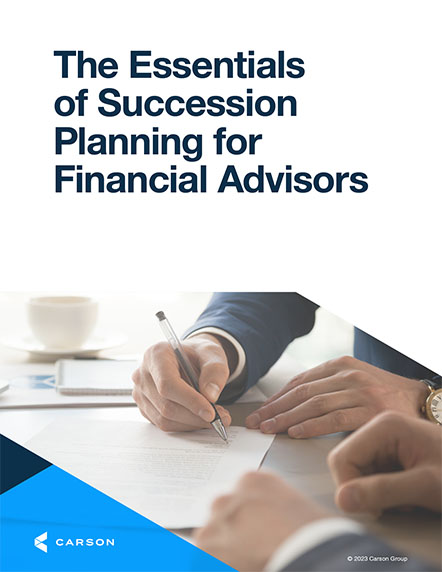Time has a way of marching forward without asking. Openly acknowledging this allows us to better envision and plan our lives, both personally and professionally. A large number of financial advisors face a critical juncture in their careers wherein decisions made or ignored today have long-lasting future implications.
There are currently more CFP®s over 70 than under 30, and about 40% of advisors plan to retire in the next 10 years.
What’s Your Plan?
While advisors spend a lot of time explaining to their clients how important legacy planning is, many independent financial advisors haven’t taken time to figure out what will happen to their business when they retire. Succession planning is not only vital for you as an advisor, but critical for the clients whose interests you oversee on a daily basis.
Whether managing millions or billions in assets, a well-formed plan ensures your practice is optimally positioned to thrive once you pass on the reins. It also protects your interests if tragedy suddenly strikes. Clients have a reasonable expectation that their money is in capable hands – whether yours or one of your associates. If you can’t explain who will take care of your clients in the future, whether you leave the business by choice or not, they will wonder, and will most likely wander to someone else they can trust.
More Than One Option
Succession planning comes with a number of options, each with its own complexities. Is there a viable internal successor within your practice? Should you pursue a like-minded advisor to whom you should sell your firm? Or will you strike a sale agreement with a larger financial institution or aggregator?
Related Content: How Advisors Can Build a Successful Internal Succession Plan (On-Demand Webinar)
For many advisors with independent practices, selling their business is the logical move that places them in the most ideal financial situation heading into retirement. If selling your business is the succession path you are traveling, you will need to ensure that your operation and book of business are appealing to a prospective buyer. Consider these three focus areas if you are looking to sell your practice.
1) Learn the True Value of Your Business
Thousands of advisors across the county are attempting to calculate their business’s value to maximize sales opportunities, but in reality, very few have an accurate gauge of what their practice is worth. Mark Hurley, former CEO of Fiduciary Network LLC of Dallas, believes many sellers are unrealistic with their own evaluation.
Succession-ready advisory firms should consider retaining a third party to value the practice. You may not be ecstatic by the results, but it provides objectivity and clarity about what you may expect to receive. At the very least, you’ll better understand the key value drivers for your business and can take the appropriate steps to improve your value over time. But remember, the value of your business is what the market is willing to pay for it, not what a third party tells you they think it’s worth.
2) Your Company Should Stand on its Own Merit
Potential buyers should feel confident that they are investing in a “disintermediated” firm – where your role is important, but not the lone factor critical to attracting, retaining and enhancing the client base. Creating an environment of disintermediation might mean developing a partnership with another advisor, merging with another company or recruiting a successor. Too often, solo practitioners find it especially difficult to make themselves dispensable, which only hampers their book of business’ desirability when the time to sell arrives.
3) Think Fee-based First
Fee-based assets are typically going to be two to three times more attractive and valuable to a potential buyer than commission-based or hybrid firms. Fee-based practices ensure steady revenue streams from your book and also speak volumes about your firm’s reputation of serving its fiduciary responsibility. The value of your business is the present value of its future cash flows, and the more recurring and predictable those cash flows are, the more the buyer is willing to pay.
Determining the future direction of your company doesn’t have to be a daunting task, but planning for your succession and eventual exit isn’t something you can do overnight. Your discipline and desire to serve your clients have been the lifeblood of your firm for decades. Take that very same approach to planning your succession. After all, it’s in your, your staff’s and your clients’ best interests to have a well-thought-out plan so all will be well taken care of once you exit the business.
Whether you sell, merge or find an internal successor, view time as one of your most valuable tools. Start today to imagine the ideal departure from your practice – the future is still yours to shape. It will pay dividends for all parties moving forward – especially you. You will live with the outcome of your succession planning (or lack thereof), so do everything in your power to make sure it aligns with your vision.


